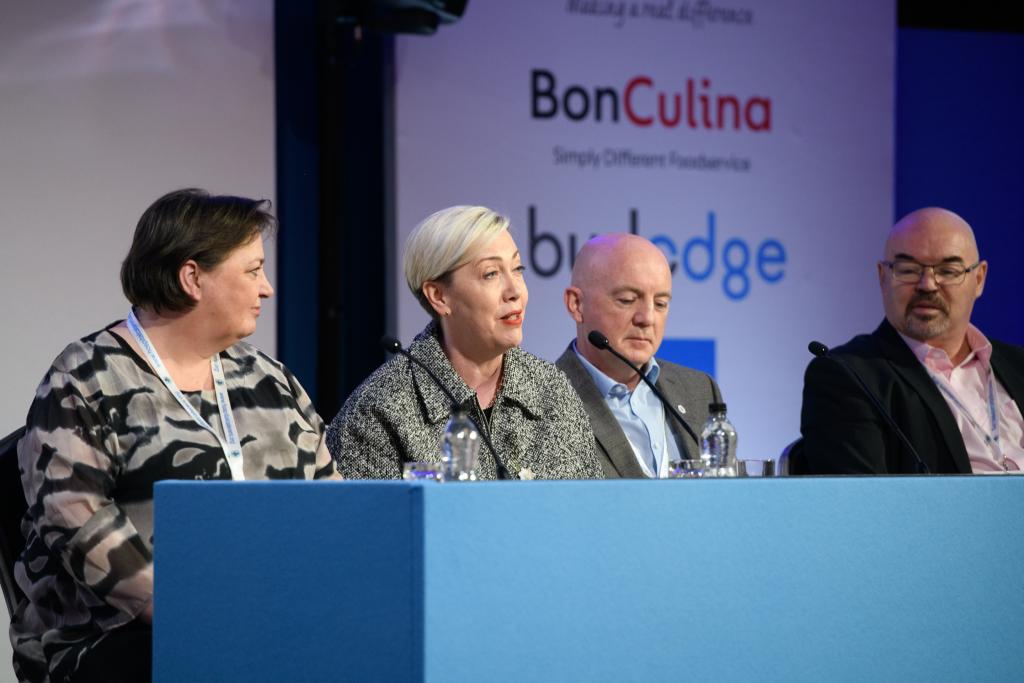Panel representing four nations discusses NHS staffing challenges

A panel representing the four nations of the UK discussed the challenges and opportunities in developing and retaining catering staff across the NHS during the recent HCA Forum.
With a focus on developing and retaining staff Duncan O’Neill (England), Deborah McNeil (Northern Ireland), Jayne Jones (Scotland), and Simon Williams (Wales) attempted to shed light on the deep-rooted staffing issues affecting NHS catering services and the collective drive to address them.
Recruitment Woes and Slow Onboarding
McNeil emphasised the time-consuming nature of NHS recruitment. “It can take six to nine months from identifying a vacancy to having someone in post,” she said. “Our pay isn’t the most competitive, so we have to highlight our other benefits more effectively.”
Jones echoed this sentiment, stressing the importance of not only recruitment but also retention: “How do we support staff across multiple sites, ensure they can access training, and make information readily available?”
O’Neill highlighted delays in onboarding, saying that while the minimum timeframe is around 12 weeks, this is still significantly slower than private contractors. “Particularly in Bands 1 and 2, candidates want to move quickly. We’re losing people before they even begin.”
Lucy Rowe, senior estates and facilities workforce manager at Workforce Development Strategies, joined the discussion to add that while background checks remained a bottleneck, steps were being taken to simplify the process. “You can now complete them via mobile – a big step forward, but still not fast enough,” she noted.
Understaffing and Creative Recruitment
A delegate voiced concerns about persistent understaffing: “We’re always at least 25% short, often more. But if we cope with 30% vacancies, we’re asked if we actually need more staff.”
Williams responded by outlining Wales’ approach. “We’ve created a flexible bank staff system managed through mobile apps. We’re also targeting under-represented groups and even looking to prisons, offering those nearing release six-month roles with full-time potential. These efforts have had wider team benefits.”
Telling a Better Story
Jones stressed the need to reshape perceptions of NHS catering. “It’s not seen as aspirational. We must tell success stories and ensure senior leaders understand the value and impact of our work, especially given the constraints we face.”
She also called for broader thinking around recruitment: “It’s not just about young people. We need to consider groups like young mothers returning to work. Our workforce should reflect the diversity of our society.”
All panellists agreed on the importance of development and support. “Appraisals, talent spotting, and providing the right tools are vital once someone is in the role,” said O’Neill.
Meanwhile, Williams highlighted the value of national tools: “We’ll be using the new HCA website for job listings – it’s efficient, and we shouldn’t be reinventing the wheel. We must also do more to celebrate our workforce.”
Despite the evident challenges, there was optimism. “Catering colleges are keen to work with us,” said Jones. “But we need to bridge the gap. We’re all stretched, but if we can connect the dots, there’s huge potential.”
Rowe closed the session with a reminder: “We’re still not doing enough on social media. If we want to reach people, especially the younger generation, we need to meet them where they are.”


